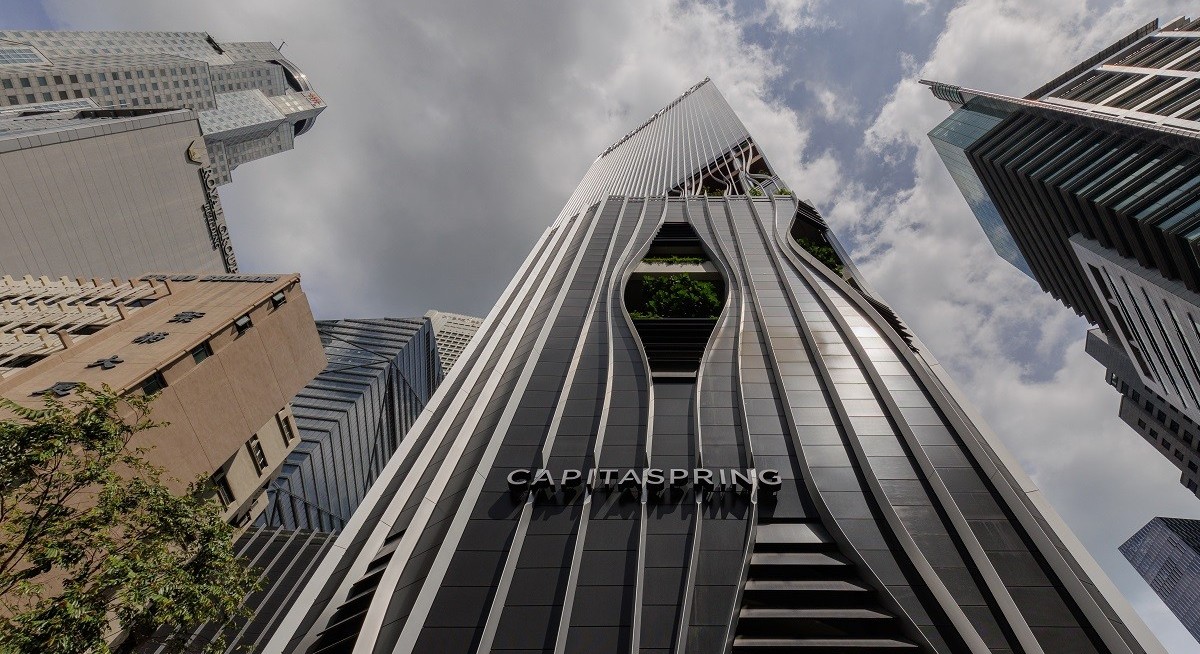“The largest integrated commercial S-REIT is well positioned to ride the upcycle in Singapore’s office and retail markets,” say Wong and Tan in their Aug 25 note.
One key factor contributing to Wong and Tan’s optimism is the complete ownership of CapitaSpring Commercial, with CICT taking over the remaining 55% that it did not own.
At the agreed valuation of $1.9 billion, CICT is adding to this stake at an entry NPI yield of 4%, in line with core CBD Grade A valuations.
Wong and Tan point out that CapitaSpring will see “substantial” renewals of anchor leases this year and next, with expiring rents ranging between $12.50 and $13 psf per month. Given the “very limited” new supply of CBD space, CICT should enjoy “sustainable” rent reversions of the asset.
See also: Stress test: Analysts weigh in on Tan Su Shan’s first year as DBS group CEO
The property has a total net lettable area of some 673,300 sq ft, consisting mainly of office space and 11,900 sq ft of retail space. Major tenants include JP Morgan Chase Bank, Millennium Capital and Sumitomo Mitsui Banking Corp.
The acquisition, which was announced on Aug 5, was completed on Aug 26. The total outlay of $482.3 million is to be fully funded with equity while taking entity-level loans at 2.7% debt cost. On a pro forma 1HFY2025 basis, accretion remains at 1.1% and aggregate leverage is expected to remain at a “comfortable” 38.3% upon completion.
“The transaction reinforces CICT’s long-term growth and portfolio value enhancement strategy, marking a strong portfolio reconstitution move via a Grade A CBD office offering higher rental visibility and entry NPI yield,” say Wong and Tan, who expect the CapitaSpring deal to help with a “strong” 3% y-o-y uplift to CICT’s FY2026 distribution per unit (DPU).
See also: ‘Path to breakeven becoming visible’ for MetaOptics
CapitaSpring aside, the analysts see CICT enjoying well-staggered growth drivers over three to five years. They expect CICT’s portfolio reversions to be maintained at mid-single digits for both retail and office assets.
Apart from organic growth drivers, completion of asset enhancement initiatives at other CICT portfolio constituents, such as IMM, Lot One and Tampines Mall, is well staggered between now and the end of FY2026, supporting growth visibility over the medium term.
“The unwinding of tax transparency at ION Orchard in our view will be the icing on the cake, which is still at a negotiation stage,” they add.
While CICT’s portfolio is predominantly Singapore-based, it also holds overseas assets, specifically in Germany and Australia, which collectively make up 3% each of the total portfolio size.
In Frankfurt, CICT owns an office building called the Gallileo, which is leased to the European Central Bank. Following enhancement works, there will be renewed income contribution from the asset towards the end of FY2025.
Wong and Tan are now expecting CICT to pay a DPU of 10.9 cents for FY2025 and 11.3 cents for FY2026, taking into account the consolidation of CapitaSpring, equity fundraising and acquisition fees in units, as well as a lower average borrowing cost of 15 bps for FY2025 to reflect lower CapitaSpring entity-level debt. Their new target price of $2.50 implies a target FY2025 yield of 4.5%.
At a broader level, CICT is also favoured because of its Singapore-focused portfolio, which serves as a proxy for the relatively resilient Singapore economy and its fundamental strength within prime retail and office asset classes.
For more stories about where money flows, click here for Capital Section
“Aside from organic growth, CICT is one of the few S-REITs with ample debt headroom, with around 38% leverage ratio as at end-FY2024, to fund future asset enhancement initiatives, acquisitions, or redevelopments,” say Wong and Tan.
In the immediate days following the announcement of the CapitaSpring acquisition, a series of positive calls had already begun.
In his Aug 6 note, Krishna Guha of Maybank Securities has kept his “buy” call, along with a revised target price of $2.35 from $2.25, to reflect lower costs of debt and equity, which he estimates will raise CICT’s DPU by 1.4%. “We await completion of the deal for inclusion of the CapitaSpring purchase,” writes Guha at that time, suggesting that a different target price is impending.
Jonathan Koh of UOB Kay Hian is more optimistic than most on this counter. In his Aug 6 note, he has kept his “buy” call and also raised his target price from an already bullish $2.72 to $2.79.
He calls CapitaSpring a “trophy asset” and expects CICT’s overall portfolio to enjoy steady performance thanks to limited new supply, which in a way functions like a “protective moat”.




